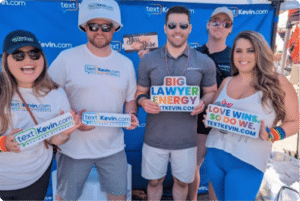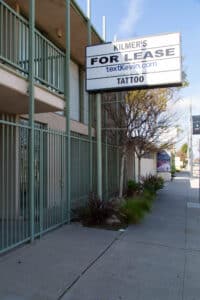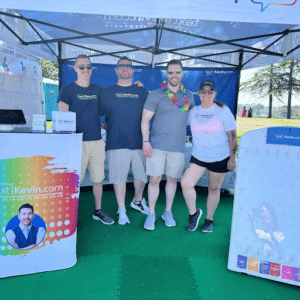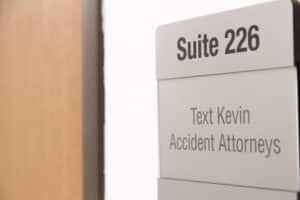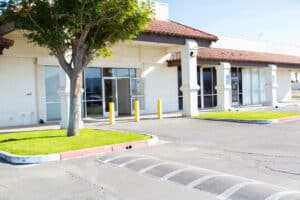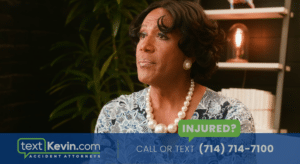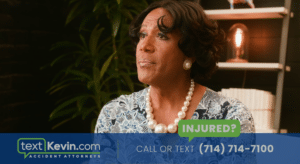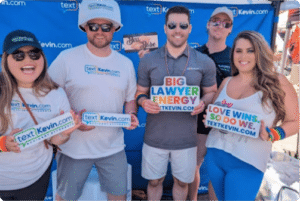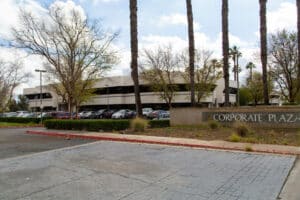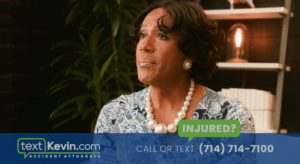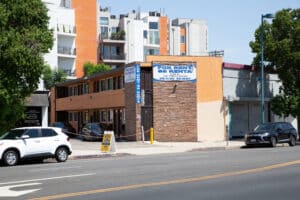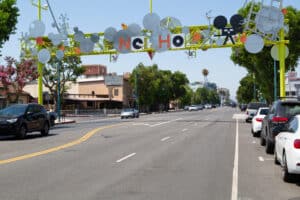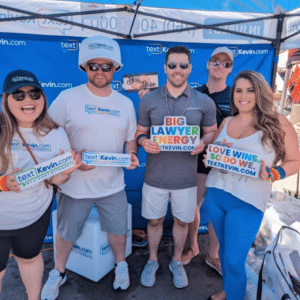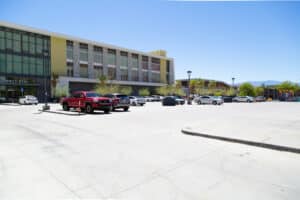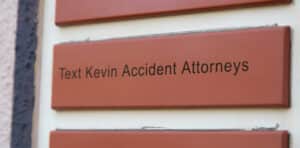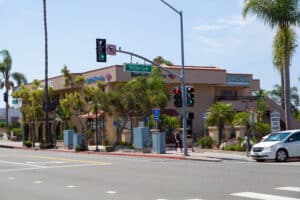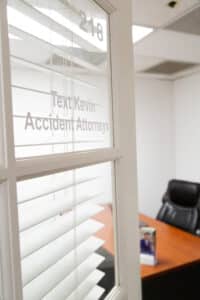Under California Vehicle Code 16025 VC: Failure to exchange info after a car accident, when a liable party causes a collision and fails to exchange contact and insurance information with the other involved party and police, they can face an infraction, punishable by up to $250 in fines.
A car accident can be a confusing, stressful experience, leaving you unsure what to do. However, there are a few actions you must take after a crash to properly get everyone’s lives back on track. One of the more important steps is exchanging information with the other parties involved.
Without the insurance information of everyone involved with the wreck, it will be much more difficult to file a successful insurance claim. It could even allow the at-fault party to get away without compensation for your suffering. Luckily, we at Text Kevin Accident Attorneys are here to help you better understand exchanging information and what to do if someone fails to do so.
What is CVC 16025?
CVC 16025 refers to the following statutes:
Under California VC 16025, (a) Every driver involved in the accident shall, unless rendered incapable, exchange with any other driver or property owner involved in the accident and present at the scene, all of the following information:
(1) Driver’s name and current residence address, driver’s license number, vehicle identification number, and current residence address of registered owner.
(2) Evidence of financial responsibility, as specified in Section 16020. If the financial responsibility of a person is a form of insurance, then that person shall supply the name and address of the insurance company and the number of the insurance policy.
(b) Any person failing to comply with all of the requirements of this section is guilty of an infraction punishable by a fine not to exceed two hundred fifty dollars ($250).
What is California VC 16025?
California VC 16025 states that anyone involved in a car accident, unless they are incapacitated, must exchange certain information with all other parties. In essence, everyone must know how to contact each other and who is responsible for paying off the damage. The information in question includes:
- Name and current address
- Driver’s license number
- Car’s identification number
- The address of the vehicle’s owner
- Evidence of financial responsibility
Financial responsibility, in this context, is the means by which the at-fault party will pay for the damage. This usually means their insurance provider, so they need to include the name and number of their insurance company, along with their policy number. Failure to provide any of this information comes with a fine of $250.
What is the Effect of VC 16025 on a Personal Injury Lawsuit?
Violations of a California Vehicle Code can severely impact the outcome of your case. When the party responsible for a wreck is found to have violated a traffic law, it looks much worse on them. In some extreme cases, it may even add punitive damages to the judgment.
Failure to exchange information also makes it more difficult to pursue an insurance settlement because California is a fault state. This means that whoever is at fault for the accident must pay for the recovery of all victims. However, a lack of information makes proving that fault much more difficult.
To violate the California Vehicle Code is a sign of negligence, which can strengthen a personal injury suit. Even if that violation did not cause the wreck, someone who would violate the code would likely be negligent in their driving. You can discuss this with a personal injury attorney to help build up a stronger case.
Note
How Do Insurance Claims Work?
One of the most vital steps after a car accident is to file an insurance claim so you can hopefully get a settlement to help with recovery. When someone else is responsible for the wreck, you would file a claim with that person’s insurance provider. This is why exchanging information is so important.
With the information you are given, you can contact the provider with details of your wreck. They will likely look into the matter themselves and provide you with a sum covering at least most of the damage. In most situations, this will be a quick and painless process.
Sometimes, the insurance provider may refuse to pay a fair amount or outright deny your claim. In those cases, you can rely on a California car accident lawyer to fight on your behalf. We can help you get the compensation you need, through negotiation or the court.
Penalties for a CVC 16025 VC Violation
Failure to exchange information after an accident will result in a fine and an infraction. You will owe up to $250, with potentially heavier penalties if you refuse. An infraction means you failed to comply with the Vehicle Code and will be a point on your license.
Whenever you incur an infraction, you receive up to three points on your license. If you rack up six points in twelve months, eight points in twenty-four months, or ten points in thirty-six months, you will be considered a negligent driver and lose certain privileges. Depending on your profession, this could majorly affect your life and livelihood.
One of the more immediate consequences of any vehicle violation is the possibility of insurance penalties. Traffic tickets or other violations of traffic law can cause an increase in the premiums you pay. If you incur enough tickets within a certain time, the insurance company may drop your coverage.
Can the Ticket be Challenged in Court?
Generally speaking, any ticket can be challenged in court. The person receiving the ticket has the opportunity to challenge it or simply plead guilty and pay the fine. However, if they feel that they have evidence, they can plead not guilty and fight it.
When one receives their ticket, they will likely be given the option to pay for it either online or through the mail. However, the ticket will also have a court date for which they will be expected to appear if they do not pay. At this court date, they will be given the opportunity to challenge the ticket and potentially have it overturned.
For example, they may seek proof that they did exchange information at the scene. They may claim that they left a note with contact information before leaving. They could have been injured and taken from the scene before they were able to share their info.
Tip
Laws Related to Vehicle Code 16025 VC
According to California VC 20002, if you are in an accident that only results in property damage, you must stop your vehicle somewhere safely and provide the driver’s and owner’s name and address to the damaged property’s owner. If you cannot find the owner, you have to leave a written notice. Information that must be left includes:
- Driver’s license
- Vehicle registration
- The current address of both the driver and vehicle owner
The main difference is that CVC 20002 refers to misdemeanor hit-and-runs, whereas CVC 16025 refers only to an infraction. CVC 16025 means that you did not exchange information, not that you fled from the scene. A hit-and-run, especially with significant property damage, will carry much heavier consequences.
Pro Tip
California Vehicle Code 16025 FAQs
Vehicle codes can be a complicated matter, with various rules to keep in mind. While a skilled car accident attorney like our team at Text Kevin Accident Attorneys can help you navigate these laws, there are a few common questions. We have listed some of them here, with an answer for each.
What info do you exchange in a car accident?
Can I exchange insurance info without the police?
What happens if you don't exchange information after an accident?
Does 16025 apply to bicycles?
According to California VC 21200, all bicyclists are subject to the same laws as any motorist. Essentially, if you are on the road, you follow the same rules as everyone else. While you may not have a vehicle registration number, you should still supply all other relevant information.
Is 16025 VC a misdemeanor?
How to fight a violation of code 16025?
When will 16025 fall off the driver’s record?
What do car accident insurance settlements cover?
What happens if the driver that hit you does not share their information?
What do I do if insurance doesn’t cover every loss?
If insurance does not cover every loss, you may want to consider a personal injury claim. Whoever is liable for your damages should be held responsible for paying them, especially if their insurance provider refuses. A lawyer like Kevin Crockett will be happy to help you build your case.
Contact Our Car Accident Lawyers Today for Legal Help
If you have been involved in a California accident, you likely need help. Even if everyone shared their information, you may still be in need of relief. Insurance likely will not cover the full extent of the damages, leaving you in need of a larger settlement.
You can rely on Text Kevin Accident Attorneys for passionate, professional help. We have countless success stories and are eager to add your case to the list. If you want help with a car accident claim, reach out to us today by phone or through our online contact form.
































